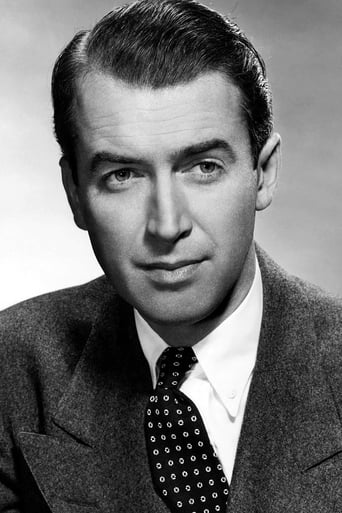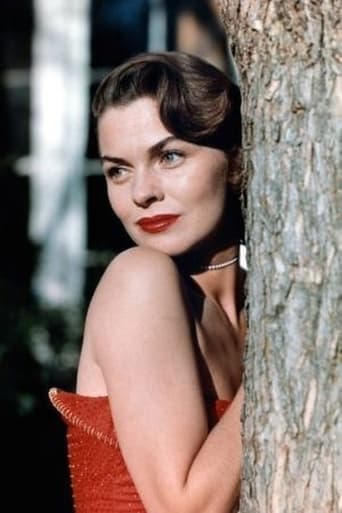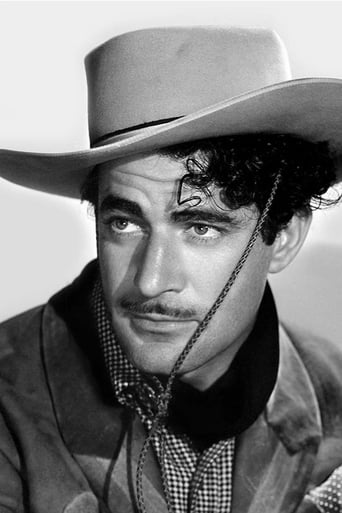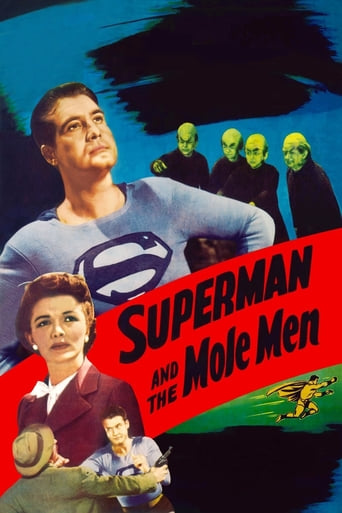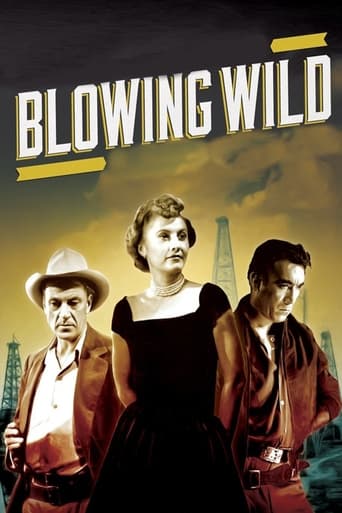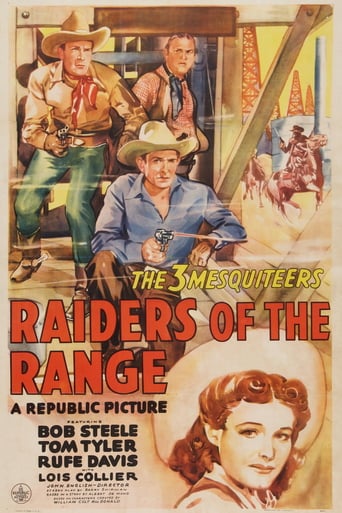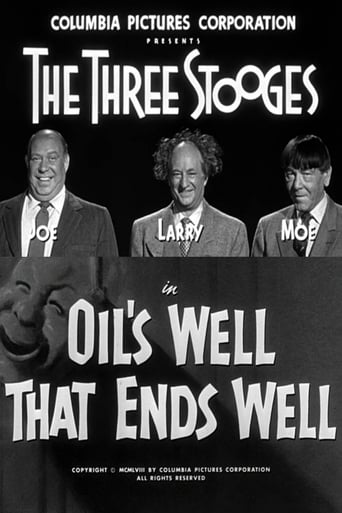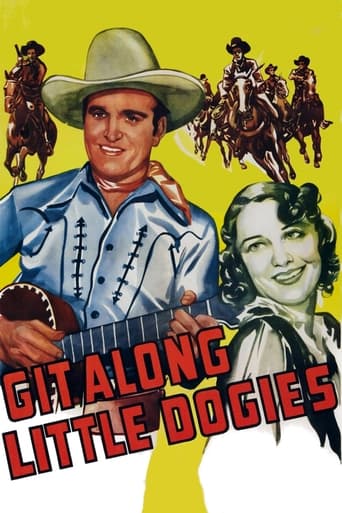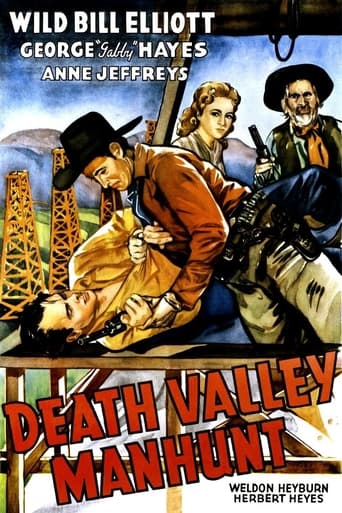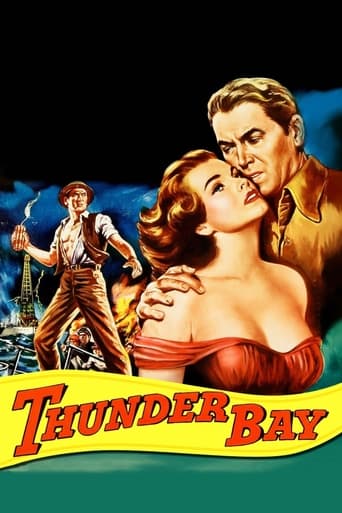
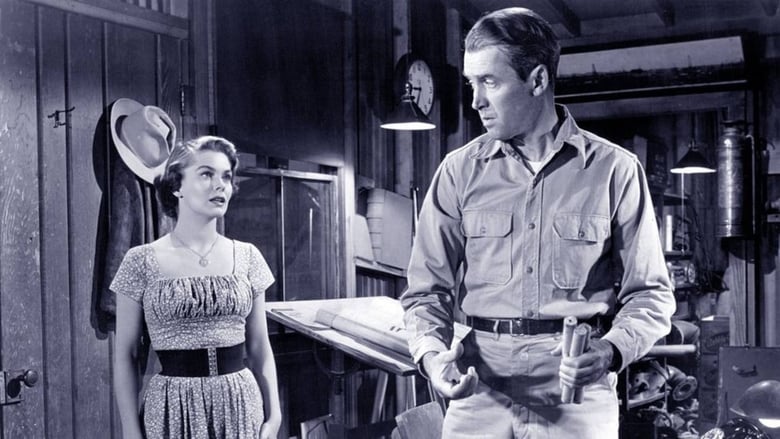
Thunder Bay (1953)
Shrimpers and oilmen clash when an ambitious wildcatter begins constructing an off-shore oilrig.
Watch Trailer
Cast
Similar titles
Reviews
I like the storyline of this show,it attract me so much
Just what I expected
if their story seems completely bonkers, almost like a feverish work of fiction, you ain't heard nothing yet.
There's no way I can possibly love it entirely but I just think its ridiculously bad, but enjoyable at the same time.
During the 1950s, until the two famously fell out over the making of "Night Passage", Anthony Mann was James Stewart's favourite director. Their partnership is best remembered for the five so-called Mann/Stewart westerns, but they also made three non-westerns together, of which this is the second. Thunder Bay is a Canadian city on the shores of Lake Superior, and there is a bay of the same name on the American side of Lake Huron, but the film is not set in either location, or for that matter anywhere in the Great Lakes. Instead it is set much further south in coastal Louisiana. The precise significance of the title is obscure, but it may be a reference to the fact that a storm features in one scene. The action takes place in the year 1946. Steve Martin, an engineer, and his friend Johnny Gambi arrive in the small fishing port of Port Felicity in order to build an offshore oil drilling platform. They are not, however, popular with the local people. The main industry in the area is fishing, especially for shrimp, and the fishermen believe that any exploration for oil will put their livelihood at risk. (The word "shrimp" in American usage obviously denotes something far larger than it would in Britain. We would call what the fisherman catch "prawns" or "scampi"; "shrimp" refers to a similar, but much smaller, species of crustacean. Hence the expression "little shrimp" to mean a small person). An added complication is the romance which grows up between Steve and Stella, the beautiful and intelligent daughter of one of the fishermen. Stella is better-educated than most of her fellow townspeople, and is one of the few with experience of the outside world, having worked in Chicago. She is, however, also one of the fiercest opponents of the oil drilling project, having been left with a deep distrust of the business community and of outsiders in general by an unhappy love-affair with a city-slicker type in Chicago. One reviewer describes the conflict in this movie as "almost Marxian", but this strikes me as overstated. Marxists have normally seen the class struggle in terms of employer/employee relationships, something largely absent from this film. What we see here is the clash of big business against small business, Big Oil versus Little Shrimp. Rather surprisingly, at least from a modern perspective, the film generally takes the side of Big Oil. The shrimpers (with the exception of one who resorts to violence) are not exactly cast as the villains of the piece, but they are shown as Luddites, standing in the way of America's inevitable progress towards a golden industrial future. Steve, Johnny and their financial backer Kermit MacDonald are the good guys because they are on the side of that future. The only bad guys on the big business side are the faint-hearts in the company who threaten to cut off funding when Steve seems to be making slow progress in finding oil. The special effects during the storm scene probably did look special in the early fifties, but today, in comparison with something like "The Perfect Storm", they are nothing much. What really dates the film, however, is its complacent assumption that it is in the public interest for big business to get whatever big business wants. Any environmental objections to its plans can simply be brushed aside or made to disappear as if by magic, as happens here. Rather improbably, Steve and Johnny not only strike oil but also discover a rich new source of shrimp, which ensures lasting wealth and prosperity for Port Felicity and removes any obstacle to the love of Steve and Stella. The Mann/Stewart westerns include some excellent films such as "The Man from Laramie" and "The Naked Spur", which brought to the genre a new emphasis on the importance of character and a greater moral complexity than the old "white hats versus black hats" formula. Their non-western collaborations, however, are not always up to the same standard. I have never seen "The Glenn Miller Story", but "Strategic Air Command" is overlong and dull, and "Thunder Bay" is not a lot better, although it is at least shorter. This is not Stewart's best performance- at times he just seems to be going through the motions- and Dan Duryea seems a bit too abrasive as Johnny. There is not the same emphasis on well-developed characters as in the Mann/ Stewart westerns and the plot is really just a romantic comedy set against the background of the oil industry, although without very much humour. Any tension or conflict is allowed to evaporate by that magic ending. "Thunder Bay" looks very dated today, and not only by the fact that the scriptwriter used the name "Kermit" for a character who wasn't a talking frog. (Although in 1953 the Muppets only lay two years in the future). 5/10
Anthony Mann/James Stewart collaboration does not work as well here, in contrast to the successful westerns ("Bend of the River" - 1952, etc.). It's about a conflict between shrimp fisherman and oil drillers, with usual bad guy Dan Duryea playing a good guy role (he's better bad, a brilliant actor), as Stewart's business partner. Somehow blue-eyed WASP beauties Joanne Dru and Marcia Henderson are the daughters of latino Antonio Moreno. For shrimp harvesters, the women are surprisingly glamorous, well-groomed, and unfazed. Dru's character does sulk quite a bit, still dazzlingly beautiful, but not the best role for her, while Henderson is chipper, petite, and fun. Gilbert Roland is hammy and forgettable. Some of the color photography is pretty good, but it's a dull, contrived misfire. (Note to prior reviewer: the film was produced in aspect ratio 1:37 to 1 in 1953, on the cusp of widescreen, and formatted in the Academy Ratio, yet released "wide", by inadequate cropping,).
Jimmy Stewart was directed by Anthony Mann in many wonderful Westerns--all made in the 1950s. They are classics--every one of them--ranging from WINCHESTER '73 to THE FAR COUNTRY to THE MAN FROM LARAMIE. However, they also made one non-Western together and this is that film. Considering the track record, I certainly expected so much more from this film. Instead of the usual high-caliber work, this film was amazingly flat and uninspiring despite having a very original story. I guess you can't win 'em all! Oddly, the film begins with Stewart and Dan Duryea as pals who are out to make a deal on an offshore oil rig. I say this is odd because usually, Duryea plays bad guys and NEVER buddies of the leading man. However, in this film he is a basically good guy--though he does have a hint of larceny about him! The oil rig is at first welcomed by the local shrimp boat operators. However, when they find that the oil company is using dynamite to help them detect oil deposits, they are afraid of losing their livelihoods and violently oppose the drilling. It is actually an interesting look at the 1950s, as Stewart is portrayed as the good guy and the dynamiting is explained away very glibly--saying it won't cause any lasting harm to the environment! As an avid fisherman, I didn't buy this explanation--nor did the shrimpers. But, the damage had already been done and the location for the well was determined quickly before the boat owners could do anything to stop this. The rest of the film follows the up and down relationship between the two factions until ultimately everyone is happy and the film ends--especially when they discover that the oil platforms are great attractants for sea life.The problem with all this is that while this might be modestly interesting from a historical sense, none of this seems compelling enough for a film. Plus, some of the characters in the film seem a bit stupid and tough to believe--apart from Duryea and Stewart. The film just seemed to lack energy or lasting appeal, though it was mildly diverting enough to merit a 6.
The outsiders are the oil guys coming into a small fishing town off the Gulf of Mexico. Jealousies erupt, fear of the new technology is involved. Businessmen are risking everything they've got "and this time it has to work or they're finished". You know the rest.You should decide for yourself whether it's the acting or the script that's marginal. Stewart plays it like he always does, but there's not much challenge in the role. I can't help but wonder if Senator Kerr (D - Okalahoma) helped finance this little "promo" piece for his company.Interesting though that this really is a look at Kerr-McGee's first offshore oil platform, which struck oil at a time when the post-war (we can make cars again!!) economy was exploding. The shrimpers are still shrimping and the oil is still flowing from that day to this (with a little break for a few hurricanes).An informally educational look back at the hot controversy that abounded at the time, 1947.
